
Mount Gilboa, sometimes referred to as the Mountains of Gilboa, is the name for a mountain range in Israel. It overlooks the Harod Valley to the north, and the Jordan Valley and Hills to the southeast to the west, respectively.

Naḥal Sorek, also Soreq, is one of the largest, most important drainage basins in the Judean Hills. It is mentioned in the Book of Judges 16:4 of the Bible as the border between the ancient Philistines and the Tribe of Dan of the ancient Israelites. It is known in Arabic as Wadi es-Sarār, sometimes spelled Surar, and by various names along different segments, such as Wadi Qalunya near Motza, Wadi al-Tahuna, and Nahr Rubin further downstream.
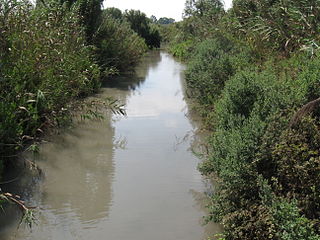
The Na'aman or Na'mein River is a stream in northwestern Israel. To the ancient writers Pliny, Tacitus, and Josephus, it was known as the Belus (Latin) or Belos River of Phoenicia.
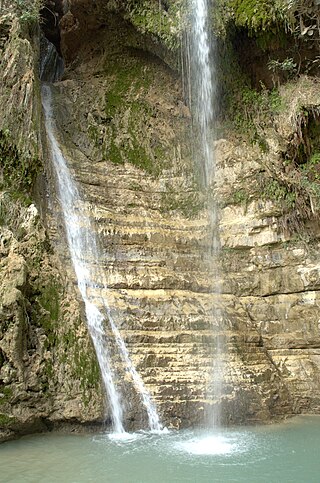
Ein Gedi, also spelled En Gedi, meaning "spring of the kid", is an oasis, an archeological site and a nature reserve in Israel, located west of the Dead Sea, near Masada and the Qumran Caves. Ein Gedi, a kibbutz, was established nearby in 1954.

The Hula Valley is an agricultural region in northern Israel with abundant fresh water that used to be Lake Hula before it was drained. It is a major stopover for birds migrating along the Great Rift Valley between Africa, Europe, and Asia.
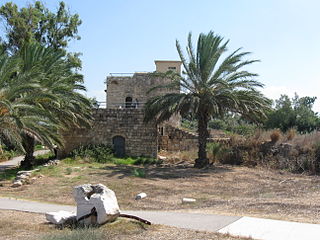
Tel Afek,, also spelled Aphek and Afeq, is an archaeological site located in the coastal hinterland of the Ein Afek Nature Reserve, east of Kiryat Bialik, Israel. It is also known as Tel Kurdani.
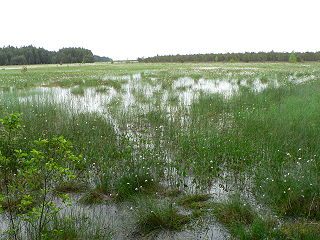
The Čepkeliai Marsh is the largest bog in Lithuania. Located in Varėna District Municipality, south of Marcinkonys village and north of Kotra River, which flows along the Belarus–Lithuania border in this area. Its area is a nature reserve and a Ramsar site.
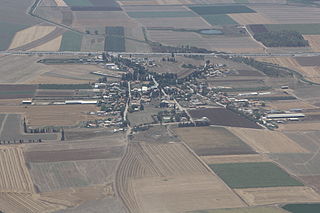
Balfouria is a moshav in northern Israel, south of Nazareth. Located near Afula, it falls under the jurisdiction of Jezreel Valley Regional Council. As of 2022 it had a population of 556.

Wadi Gaza and Besor Stream are parts of a river system in the Gaza Strip and Negev region of Palestine and Israel. Wadi Gaza is a wadi that divides the northern and southern ends of the Gaza Strip, its major tributary is Besor Steam. In 2022 work began to rehabilitate Wadi Gaza Nature Reserve.

Gazelle Valley, previously known as the Pri Har Valley, is an open space of 260 dunams in the heart of Jerusalem, Israel, on the edge of the Givat Mordechai neighborhood, opposite the busy Patt Intersection.

Kerem Ben Zimra is a moshav in northern Israel. Near Safed in the Upper Galilee, it falls under the jurisdiction of Merom HaGalil Regional Council. In 2022, it had a population of 535.
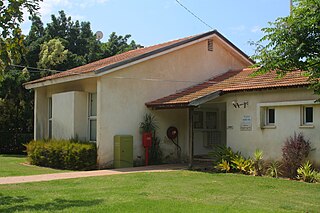
Bitan Aharon is a moshav in central Israel. Located in the Sharon plain between Hadera and Netanya, it falls under the jurisdiction of Hefer Valley Regional Council. In 2022 it had a population of 167.

National parks of Israel are declared historic sites or nature reserves, which are mostly operated and maintained by the National Nature and Parks Authority. As of 2015, Israel maintains 81 national parks and more than 400 nature reserves, many of them in the occupied West Bank, that protect 2,500 species of indigenous wild plants, 32 species of fish, 530 species of birds and 100 species of mammals.

Ein Hemed is a national park and nature reserve in the hills seven kilometres west of modern Jerusalem and some 12 kilometres west of the Old City. It is also known by the Latin name it received from the Crusaders, Aqua Bella, and as Khirbat Iqbalā in Arabic. The park is located on the path of an old Roman road, also used in later periods. The road connected the coastal plain with Jerusalem, passing through Bab al-Wad. A fortified Hospitaller building from the Crusader period, relatively well preserved, is arguably the main attraction beside the streams and lush vegetation.

Ein Feshkha or Einot Tzukim is a 2,500 ha nature reserve and archaeological site on the north-western shore of the Dead Sea, about 3 km (1.9 mi) south of Qumran in the Judea and Samaria, Israel. It is located just north of the headland Râs Feshkhah, the "headland of Feshkhah". Within the reserve is a group of springs of brackish water. The nature reserve consists of an open section with pools of mineral water for bathing surrounded by high foliage and a section that is closed to visitors to protect the native flora and fauna.

Hurshat Tal is a national park and nature reserve in the Northern District of Israel. In 1968, 765 dunams were declared national park lands and 107 dunams were declared a nature reserve.

Nahal Betzet, is a once-perennial and now intermittent stream in the Upper Galilee, Israel. Most of it is part of the nature reserve named for the stream.
Ein Nymphit is a small nature reserve northwest of Tel Afek, south of Kfar Masaryk, Israel.

Ein Farah or 'Ayn Fara, known in Hebrew as En Prat, is a spring located at the head of Wadi Qelt, 325 metres above sea level, between Jerusalem and Jericho in the West Bank. Until 1970, the water of the spring was pumped to supply Jerusalem. Since the 1970s it is part of the Israeli En Prat nature reserve. The spring flows into a natural rock pool, and its output creates a brook that flows all year round.

The Bethsaida Valley, Arabic: Buq'at al-Butayhah, is a valley by the northeast shores of the Sea of Galilee at the steep foothills of the central Golan Heights.





















